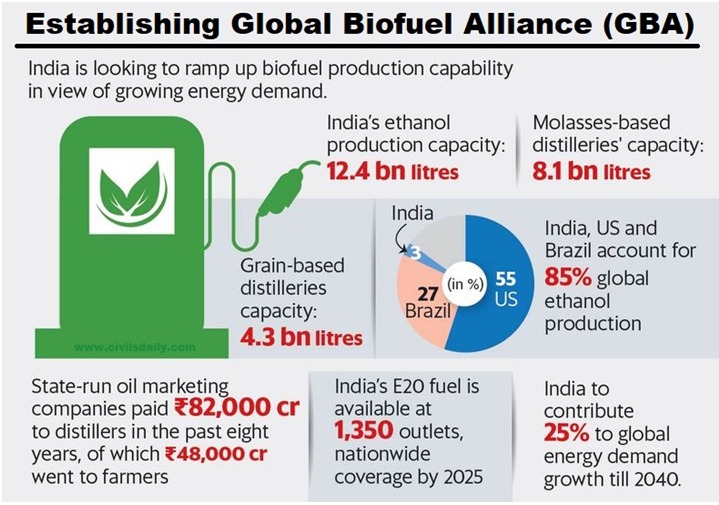August 2, 2023
Global Biofuel Alliance (GBA): Fostering Sustainable Energy Collaboration

Source: Mint
Introduction
- The upcoming 14th Clean Energy Ministerial and Eighth Mission Innovation (CEM14/MI-8) conference, scheduled to take place in Goa from July 19-22, 2023, aims to achieve a momentous milestone – the establishment of the Global Biofuel Alliance (GBA). As a crucial priority under India’s G20 Presidency, the GBA draws inspiration from the successful International Solar Alliance (ISA), initiated by India and France in 2015 to combat climate change through solar energy adoption. The primary objective of the GBA is to promote international collaboration and cooperation, fostering the acceptance and utilization of biofuels across the globe.
Core Members and Membership
- The GBA’s core members consist of Brazil, the United States, and India, envisioning significant impact on the global energy architecture and the attainment of net-zero emissions. While the alliance is spearheaded by these three nations, it remains open to endorsement by other countries seeking to join the initiative, with membership inclusive of non-G20 nations.
Focus Areas of GBA
- The Global Biofuel Alliance will concentrate on several key areas to achieve its objectives:
- Strengthening Markets and Facilitating Global Biofuel Trade: The GBA will work towards creating robust biofuel markets while facilitating international trade of sustainable biofuels.
- Sharing Concrete Policy Lessons and Providing Technical Support: The alliance aims to share successful case studies and best practices from the biofuel industry, providing technical support to foster national biofuel programs worldwide.
Significance of GBA
- The establishment of the Global Biofuel Alliance holds immense significance for multiple reasons:
- Addressing OPEC+ and Reducing Dependence on Conventional Hydrocarbons: The GBA represents India’s strategic focus on reducing dependence on conventional hydrocarbons, urging increased production by the OPEC+ nations.
- Transformative Opportunities for Sustainable Growth: By promoting the adoption of sustainable biofuels, the GBA offers transformative opportunities for economic development, rural progress, energy self-sufficiency, reduced air pollution, and a cleaner energy transition.
India’s Biofuel Achievements
- India has made substantial progress in the field of biofuel production and adoption, establishing a strong foundation for the GBA’s objectives:
- Ethanol Production Milestone: In the fiscal year 2020-21, India produced 4.08 billion liters of ethanol, achieving an impressive blending rate of 10.02%. This resulted in a reduction of 2.7 million tonnes of CO2 emissions.
- Ambitious Goals: India aims to achieve a blending rate of 12% by 2022-23 and a goal of 20% blending by 2025, requiring an expanded production capacity of ethanol to 17 billion liters.
- Focus on Compressed Bio-Gas (CBG): India actively promotes compressed bio-gas (CBG) derived from waste through the Sustainable Alternative towards Affordable Transportation (SATAT) program. The country aims to install 5,000 CBG plants across the nation by 2024.
Biofuel Advancements in Aviation
- India has also made significant strides in adopting sustainable aviation fuel (SAF):
- First Commercial Passenger Flight: India successfully conducted its maiden commercial passenger flight using a blend of sustainable aviation fuel (SAF) produced domestically.
- Bio-Aviation Turbine Fuel Programme Committee: The establishment of this committee signifies India’s commitment to advancing the use of SAF in the aviation sector.
- Blending Targets: India aims to achieve a 1% SAF blend in jet fuel by 2025, requiring 140 million liters of SAF per year. Additionally, it has set a more ambitious target of a 5% blend, necessitating approximately 700 million liters per year.
Global Response
- While Brazil has expressed support for the GBA and its objectives, Saudi Arabia’s focus on conventional hydrocarbons has not favored the initiative. Russia’s involvement in the OPEC+ group has led to the implementation of production cuts despite the fragile global economic recovery. On the other hand, China, a major biofuel producer, opposed the India-led initiative and boycotted a G20 meeting on tourism held in Srinagar.
The Conclusion
- The establishment of the Global Biofuel Alliance marks a significant stride towards promoting international collaboration and fostering the adoption of sustainable biofuels.
- India’s remarkable achievements in biofuel production and advancements in aviation fuel lay a strong foundation for the alliance’s objectives, providing hope for a cleaner, greener, and more sustainable energy future for all.
- The GBA’s focus on promoting biofuels presents a transformative opportunity to tackle climate change, bolster economies, and drive sustainable development across the globe.
Daily Gist : The Hindu/Indian Express : 30 Jan 2025
January 30, 2025
Gist of editorial : the Hindu/ Indian Express/20 Jan 2025
January 20, 2025
Daily the Hindu/ Indian Express Editorial Gist: 14 Jan 2025
January 14, 2025
